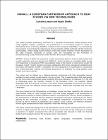| dc.description.abstract | This paper presents preliminary outcomes of a European Commission funded project which
brings together industry, academics and practitioners in an innovative project to create an
international forum of learning. SIGNALL II builds on the successes of SIGNALL I (a Leonardo da
Vinci project). It is promoted by Interesource Group (Ireland) Limited partnered with the Centre for
Deaf Studies, Trinity College Dublin (Ireland), Irish Deaf Society (Ireland), Finnish Association of
the Deaf (Finland), University of Sussex (UK), the Foundation for the Promotion of
Entrepreneurship, Lodz,(Poland) and Grant Advisor, Brno (Czech Republic).
SIGNALL 2 aims to utilise the experience, results, partnership alliances and the relationships built
up with supporters and user groups from SIGNALL I and to develop an accredited digital course
on Perspectives on Deafness (POD). Accreditation leads to the transfer of credit points (under the
European Credit Transfer System) amongst participating third level educational establishments
promoting international mobility in education and the transparency of qualifications. Experiential
and evidenced-based material will illustrate experiences of deafness by using digitized case
studies and video materials.
The course will be offered as a distance-learning programme with fully accessible (signed,
subtitled) course content in each partner country on-line. This is essential given that Deaf people
are the most under-represented group accessing third level education, for example, [17], [5], and
is challenging given the linguistic diversity of the European Union. For example, signed
languages differ from territory to territory, even where spoken languages are the same (i.e. Britain
and Ireland have very different natural signed languages ? British Sign Language and Irish Sign
Language).
The core content for the `Perspectives on Deafness? course has been created by the Centre for
Deaf Studies (CDS) at Trinity College Dublin. CDS has actively engaged in the development of
digital learning assets to support traditional delivery of programmes, and are actively engaged in
the development of blended learning diplomas and degrees. European perspectives are added,
allowing for the exploration of shared ? and differing- experiences of Deafhood [14] across
Europe as well as notions of d/Deafness as a medical, social, cultural, and historical construct.
Human rights perspectives are also explored in this wide reaching course.
This paper outlines the background to the development of this course, outlining rationale, content,
creation of digital materials, the nature of international involvement and the challenges to creating
a repository of digital courseware that will be accessible and relevant to Deaf and hearing
students and employers across the European Union, and beyond. | en |




